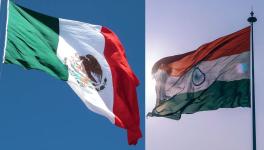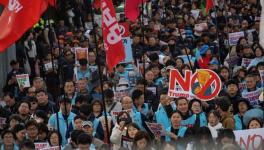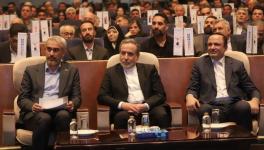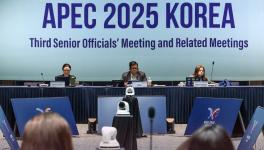Transitional Period Ahead in US-China Relations
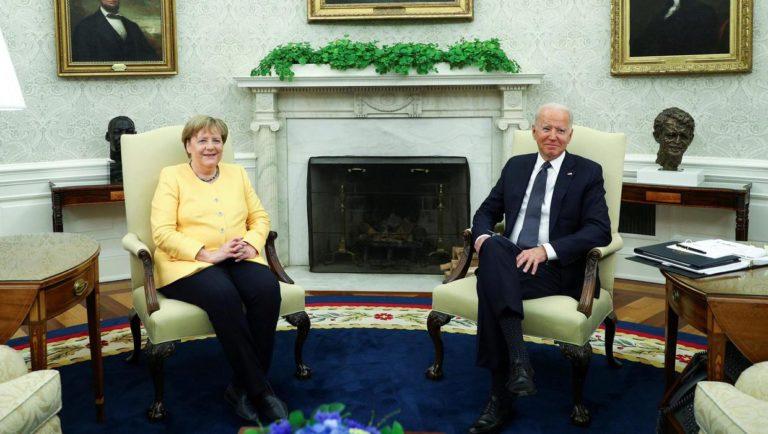
German Chancellor Angela Merkel (L) paid an ‘official working visit to White House and held talks with President Joe Biden (R), July 15, 2021
The ‘official working visit’ by the German Chancellor Angela Merkel to the White House on July 15 has been most conspicuous for its subdued tone regarding the most fateful topic of her discussion with President Joe Biden — China.
Merkel’s guarded remarks about China at the joint press conference with Biden came as no surprise but what took the breath away is that Biden himself treaded softly on that topic.
Merkel is a highly experienced stateswoman with a superb mastery of the use of parentheses in her articulation of policies and strategies. She agreed with Biden that relationship with China is among the many priorities in foreign policy today; that “wherever human rights are not guaranteed, we will make our voices heard and make clear that we don’t agree with this” but Germany is “also for territorial integrity of all countries of the world.”
Merkel disclosed that they “talked about the many facets of cooperation and also of competition with China, be it in the economic area, be it on climate protection, be it in the military sector and on security” — making it clear that China cannot be branded in one-dimensional terms as an adversary.
Merkel said “there is a lot of common understanding (between Germany and the US) that China, in many areas, is our competitor”; that trade with China “needs to rest on the assumption that we have a level playing field.” But then, she pointed out that, “the driving force” behind the EU-China Agreement on trade that was negotiated last December, much to the displeasure on the part of the Biden administration, was about fair trade practices.
In fact, Merkel flagged that the December agreement with China also commits Beijing to “abide by the core labor norms of ILO” — an indirect reference to the US pressure to boycott China for alleged forced labour practices in Xinjiang.
Merkel is “convinced of our needing to be technological leaders… in many, many areas” but then, “Obviously, it’s legitimate for China wishing to do this as well, but, for example, we will cooperate in many technological state-of-the-art technologies — for example, CHIPS.” Merkel rounded up:
“And then there are interests, obviously — sometimes divergent interests, but sometimes common interests. But we also have, obviously, areas where American companies compete with European companies, and we have to accept that. But I think, basically, the rules as to how we deal with China ought to rest and do rest on our shared values.”
The heart of the matter is that Biden may be coming closer to Merkel’s thinking on China. More likely, Biden himself is in a reflective mood after the extended interaction last month, in formal and informal setting, in Europe recently with the Western leaders, including Merkel, where China was most of time time the proverbial elephant in the room.
As a mater of fact, in the On-the-Record Press Call on June 17 from the White House by National Security Advisor Jake Sullivan, there was ample hint of new stirrings in the US’ China policies. Sullivan let it be known that Biden “will look for opportunities to engage with President Xi going forward.”
Sullivan added, “soon enough, we will sit down to work out the right modality for the two presidents to engage.” As he put it, Biden is very much committed “to ensure that we have that kind of direct communication that we found valuable with President Putin yesterday… It’s now just a question of when and how.”
Evidently, Sullivan has been on the ball since then. We now hear that the US Deputy Secretary of State Wendy Sherman is due to meet with Chinese Vice Foreign Minister Xie Feng in the Chinese northeastern port city of Tianjin next week.
Reporting this, the Moscow daily Nezavisimaya Gazeta commented yesterday, “Although the White House has branded China a key potential adversary, Biden believes that face-to-face contact will clarify on which issues the sides would find common ground and where it would not.”
Again, ten days ago, there were some definitive signals that the ground beneath the feet with regard to the US approach to China might have begun shifting. This was discernible in the hour-long presentation by Kurt Campbell, who is the White House Coordinator for the India-Pacific and deputy assistant to the president — better known as Biden’s “Asia tsar”.
Campbell was addressing the Asia Society, the influential NewYork-headquartered organisation that historically illuminated the Sino-American pathways and enhanced mutual understanding.
Campbell has a reputation for hawkish views and therefore, his mellowed views regarding the future trajectory of the US policy merit attention. Evidently, six months into the Biden presidency, after a lot of cogitations internally as well as with America’s allies, Campbell was speaking in the backdrop of discussions under way for a meeting between Biden and Xi.
One passage from Campbell’s presentation is reproduced below if only to give a flavour of what is afoot. In response to a pointed Churchillian query from the president of Asia Society Kevin Rudd, a well-known expert on China and a former diplomat and Australian prime minister, as to whether a Cold War with China can be prevented at all, Campbell said:
“I don’t like the framing of the cold war very much. I’ve appreciated the work you’ve done on this. I am fearful that that framing obscures more than it illuminates. And I think it hardens us to fall back on patterns and thinking that is in no way helpful really, fundamentally to meet some of the challenges presented by China… I believe the defining characteristic of the period ahead will be around competition and also at the same time finding areas where the United States can — it’s not necessarily cooperation, it can be just alignment of policies… The challenge ahead will be to present China with some opportunities … [Scroll down to 32nd minute.]
The quote above should give a flavour of a highly nuanced China policy being finessed in the White House. (Rudd at one point began speculating whether it might not be a good idea for Australia to press the “pause” button on anti-China rhetoric for some time so that an opportunity becomes available for the relationship to be mended!)
Equally, on Taiwan, Campbell flatly ruled out any hollowing out of the “One-China policy.” He said forcefully that while the US supports “a strong unofficial relationship” with Taiwan, there is no question of encouraging Taiwan’s independence. He admitted that it can be a delicate dangerous balance but felt it must be maintained.
Clearly, just as hints of a thaw in the US-Russia relations might have appeared lately, a transitional period seems to lie ahead in the Biden administration’s policy toward China as well. Campbell confirmed the likelihood of a meeting between Biden and Xi Jinping “in the not too distant future.”
Get the latest reports & analysis with people's perspective on Protests, movements & deep analytical videos, discussions of the current affairs in your Telegram app. Subscribe to NewsClick's Telegram channel & get Real-Time updates on stories, as they get published on our website.










